8 Healthy Foods That Naturally Boost Collagen
Up your body's collagen stores by eating these healthy ingredients.
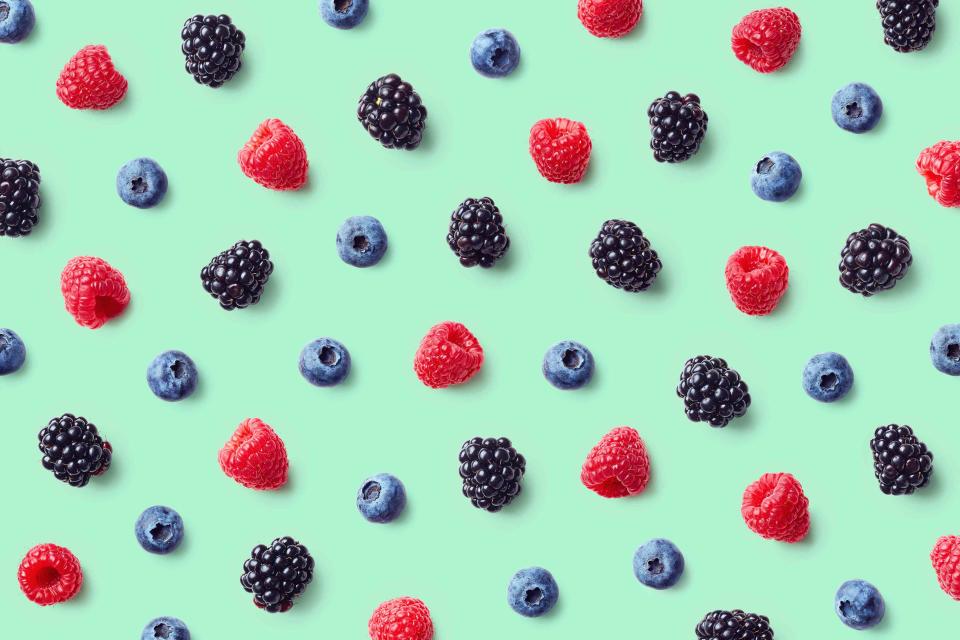
baibaz/Getty Images
When it comes to trendy dietary supplements, collagen products are up there with the trendiest of them. Sales of collagen-rich powders, drinks, and capsules have soared in recent years, promising healthier hair, skin, nails, bones, joints, and muscles. Collagen occurs naturally in the body, but does taking a collagen supplement actually help boost its production and benefits? And many foods also support natural collagen production—are these any better?
Here’s why collagen is important in the body, whether dietary collagen (ingested via food or supplement form) produces the benefits you’re looking for, and some of the best collagen-boosting foods to eat.
Related: 11 Foods High in Vitamin E for Healthy Skin, Hair, Immunity, and More
What Is Collagen, and Why Is It Good for You?
“Collagen is a protein that gives structure to muscles, bones, skin, and tendons,” says Bianca Tamburello, RDN, registered dietitian at FRESH Communications. While there are technically five types of collagen, most sources of collagen will end up offering these benefits in addition to supporting the organs, hair, nails, ligaments, eyes, and arteries. As such an important building block to these vital structures, collagen is found in abundance throughout the body. “Our body makes collagen, but we also can get collagen through foods and supplements,” Tamburello explains.
As we age and are exposed to environmental factors like ultra violet (UV) light, collagen production in the body begins to decline. This is where collagen supplementation, either through food or dietary supplements, can play a supporting role.
Related: 10 Important Foods That Support Hair Growth, Strength, and Health
Is Taking Collagen Effective?
Collagen supplements are somewhat controversial, and there are questions over whether they actually work. This is due to the lack of clarity around whether ingested collagen will simply be metabolized like other types of protein, rather than ending up as bodily collagen in the desired places.
However, research actually shows otherwise, and has proven collagen supplements, especially those made with hydrolyzed collagen broken down for better absorption, to be effective. Research has shown collagen intake to be associated with increased skin elasticity, UV protection, heart health support, bone maintenance, improved muscle strength, and joint pain relief.
“Taking collagen supplements may decrease joint pain by preserving cartilage, boost skin hydration and elasticity, and decrease muscle mass loss and bone loss associated with aging,” Tamburello says. “While more research is needed, so far studies indicate that collagen supplements may also support hair, nail, and gut health.”
Tamburello adds that supplements with hydrolyzed collagen can have a leg up in this regard over food-based collagen, as “collagen from foods needs to be broken down before absorption,” she says.
Related: Our Guide to Complete Protein Foods—and Why They Matter
Food Nutrients That Help the Body Produce Collagen
Food-based collagen absolutely does benefit the body, too. Two of the most effective ways to boost collagen stores in the body are focusing on consuming nutrients that support collagen production and eating foods that are themselves high-collagen.
“A varied diet is important to ensure you’re getting the nutrients needed for the body to make collagen,” Tamburello explains.
“Certain amino acids including glycine, proline, and hydroxyproline serve as the building blocks for collagen, and in this way, support collagen production,” she says. “Vitamin C and zinc are also needed to help the body make its own collagen for body structure and functions.”
Copper and sulfur are two minerals that also aid in natural collagen production throughout the body.
Related: These 6 Nutritious Foods Help Support Healthy Joints
Foods High in Collagen and Collagen-Boosting Nutrients
Fish
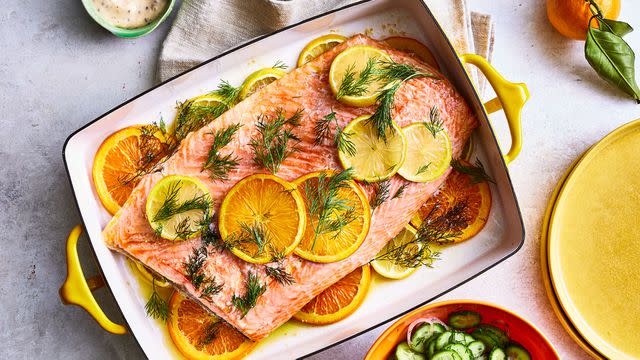
When it comes to producing collagen naturally, fish is one of the best foods you can turn to. “One study found that fish collagen is one of the most efficiently absorbed food sources of collagen,” Tamburello says. “I recommend salmon from Chile because it’s particularly high in omega-3 fats and offers up high quality protein in the form of amino acids to support collagen production.”
Other great options include some of the smaller fish, like anchovies and sardines, as they’re packaged with their skin, bones, and connective tissues intact. And while these structures thankfully dissolve away so you barely know you’re eating them, they’ll provide both amino acids and collagen to support natural production.
Citrus Fruits
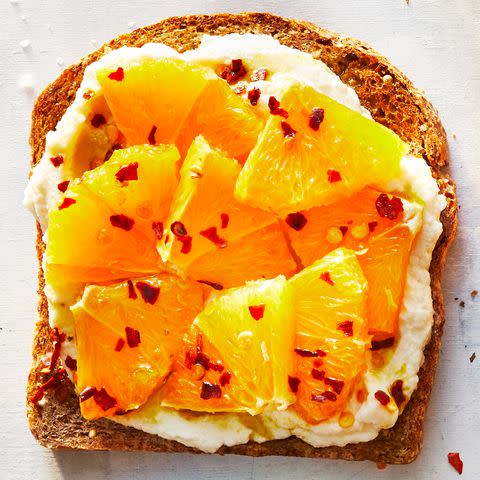
There are few foods higher in vitamin C than citrus fruits like orange, lemon, grapefruit, and lime. “Vitamin C helps preserve collagen in the body and plays an important part in the body’s process to create its own collagen,” Tamburello says. Whether you opt for a glass of fresh-squeezed lemon water, a grapefruit half at breakfast, or make a festive citrus fruit salad, all of these delicious citrus dishes will help to support healthy skin, hair, nails, joints, and more.
Eggs
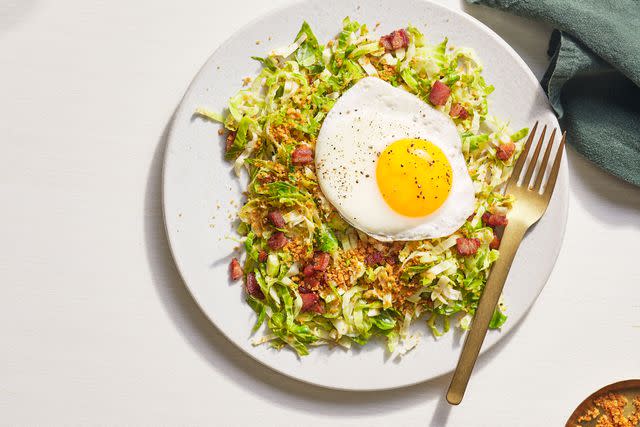
Fred Hardy
Shaved Brussels Sprouts Salad With Fried Eggs and Pancetta
Between the proline, zinc, and sulfur found in eggs, these breakfast-time favorites support collagen-building in the body. While zinc is mostly found in the egg yolk, proline and sulfur are largely concentrated in the whites, so those watching their dietary cholesterol intake by eating egg whites alone can still reap some of these collagen-boosting benefits.
Berries
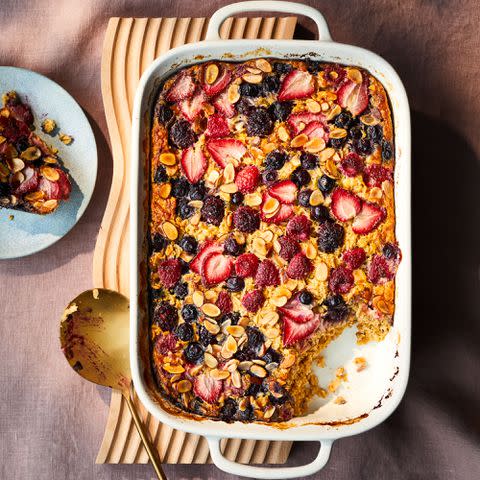
Whether it be strawberries, raspberries, acai, blueberries, cranberries, or another delicious berry, these juicy fruits are absolutely packed with collagen-building vitamin C. There’s a nearly endless number of ways to savor them: in smoothies and smoothie bowls, oatmeal, baked goods, yogurt parfaits, savory salads, homemade jams, and so much more.
Bone Broth

knape/Getty Images
“Bone broth is one of the most well-known high-collagen foods,” Tamburello says. You can make your own bone broth at home, although the process can be very time consuming. There are also tons of bone broth products available—which can make choosing a reputable brand a challenge for food shoppers.
“Azuluna’s Pasture-Raised Chicken Bone Broth is specifically formulated for sipping and packed with 8 grams of collagen and 14 grams of protein per serving. Plus, the brand supports regenerative farming and sustainable agriculture,” Tamburello says.
Beans
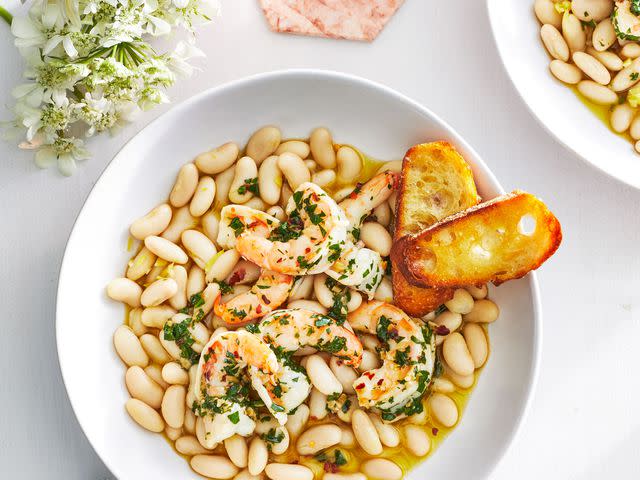
Buttery Shrimp With Marinated White Beans
There are many vegan sources of protein that provide the amino acids needed to support collagen production, including hearty legumes like beans. Beyond offering an array of collagen-building amino acids, many bean varieties, including pinto beans and white beans, are also fantastic sources of copper.
Skin-On Poultry

Christopher Testani
This may be one of the few times that you’ll find skin-on poultry in a health-focused food round-up, but when it comes to collagen production, meat and fish skin can actually be a game changer. “Although we don’t always eat every part of the animal, the skin of poultry also contains collagen and should not be overlooked,” Tamburello says.
Shellfish
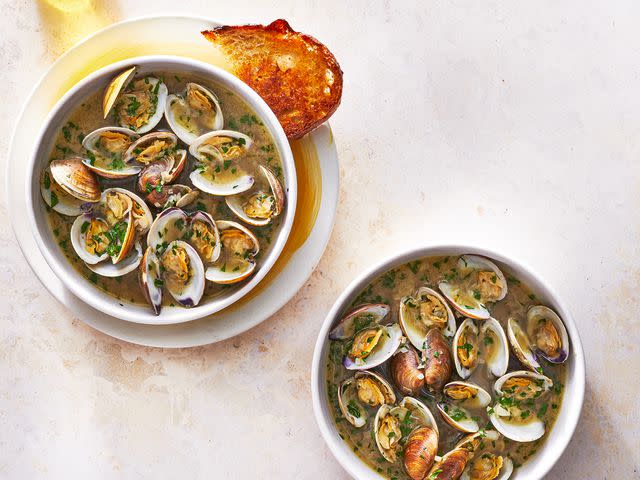
CAITLIN BENSEL
Steamed Clams With Garlic Toasts
Shellfish, especially clams and oysters, are very effective collagen-boosters. Not only are these briny delights full of a variety of amino acids for building collagen, but they’re some of the best food sources of copper and zinc to help you reap all the benefits of collagen.
Related: 7 Important Foods for Healthy Eyes and Vision (Besides Carrots)
For more Real Simple news, make sure to sign up for our newsletter!
Read the original article on Real Simple.


